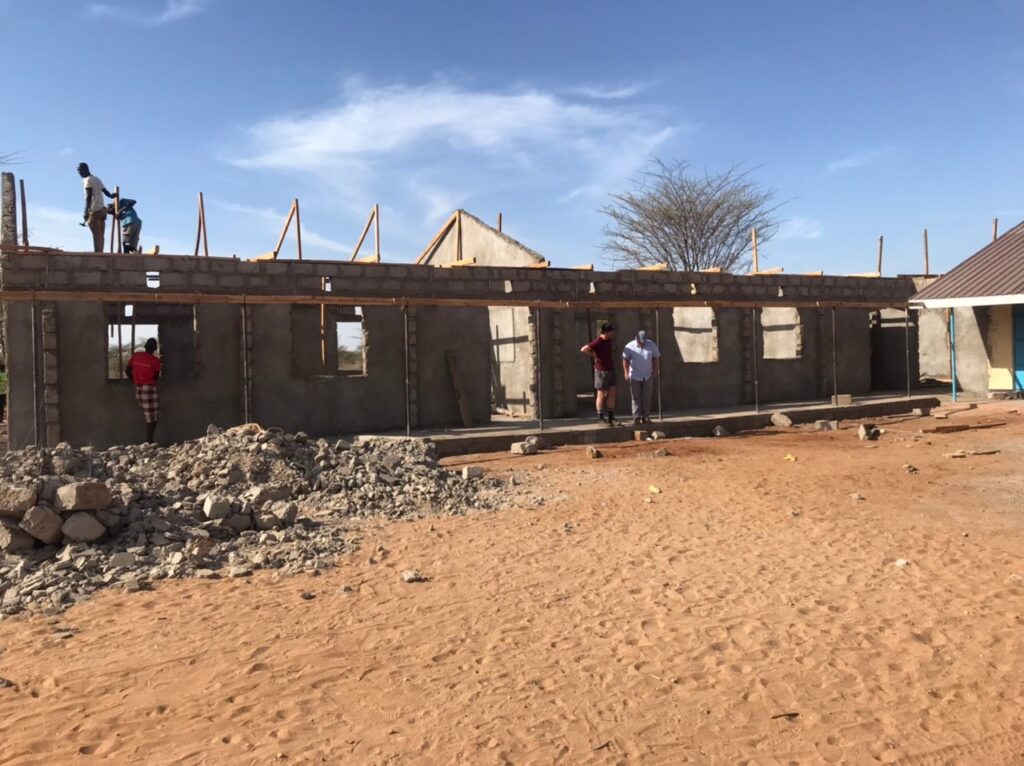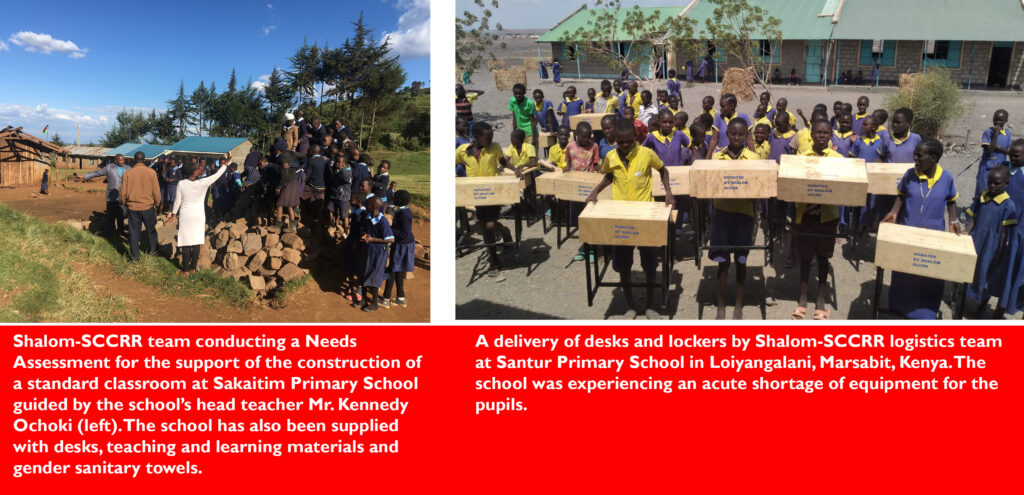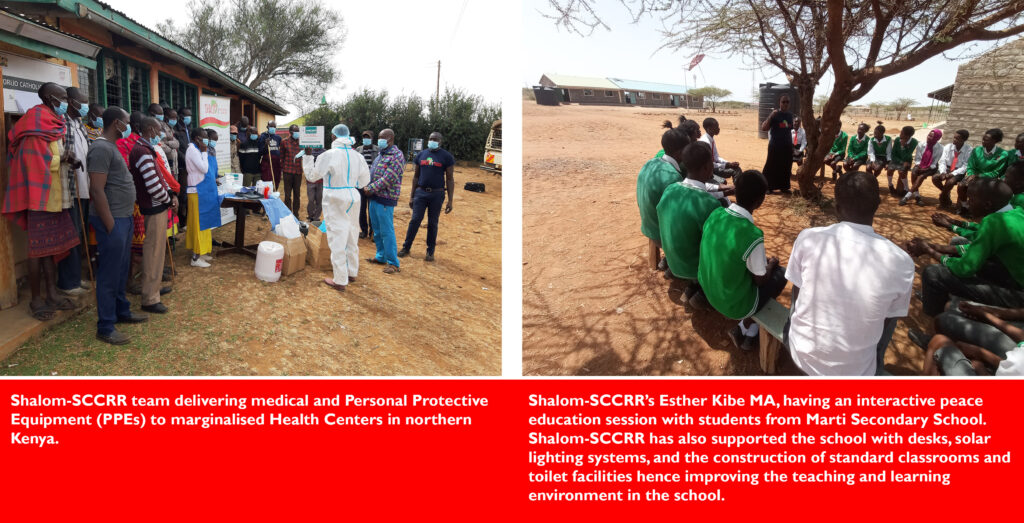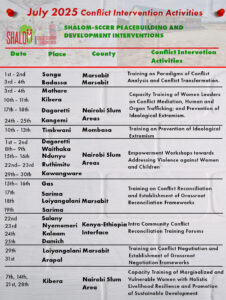By: Godfrey Okoth MA,
The development of school infrastructure is crucial in promoting peace and stability in communities that face protracted conflicts. Access to quality education and opportunities for learning not only contribute to individual growth and development but also has a positive impact on social cohesion thus making education a long-term dividend for peacebuilding. Shalom-SCCRR’s School/ Educational Development Projects coupled with the Peace Education Syllabus have motivated the emergence of inter-ethnic and inter-religious schools which are serving as important centers for social interaction, inculcating a culture of understanding and tolerance between young people coming from ethnic identities that often manifest very adversarial relationships. This helps to create a culture of peace and reduce the likelihood of conflicts arising based on differences in ethnicity, economy, and religion.

The provision of safe and secure schools in conflict-prone areas has been instrumental in the restoration of a sense of security and normalcy in communities thus promoting increased enrollment rates, especially among children facing the risk of recruitment into extremist and radicalized groups. This can also have a positive impact on the mental and emotional well-being of students and teachers, who are often deeply affected by conflict.
Moreover, Shalom-SCCRR’s approach to education development continues to play a powerful role in promoting gender equality and empowering women and girls, who are often marginalized and excluded from education opportunities in conflict-affected areas. Access to quality education has broken down gender-based barriers, promoting equality, and contributing to the transformation of deep-seated cultural practices that have traditionally trivialized women’s role in the socioeconomic and political progression of society.
School/ Educational Development Projects Significant Outputs
52 School/ Educational Development Projects completed, emerging from Conflict Transformation interventions.
14,500 Pupils and Students benefiting from Shalom-SCCRR funded projects: Classrooms, Accommodation facilities, Solar lighting systems, Gender sanitary items, Books, Desks, School Water systems, Science Laboratory Equipment etc.
18,096 Pupils and Students benefiting from Shalom-SCCRR Peace Education Syllabus implemented in primary and secondary Schools located in violent conflict zones.
49 Shalom-SCCRR established and supported SHALOM Peace Clubs, implementing conflict transformation activities in areas affected by interethnic conflicts/ religious ideological extremism and marginalization.
Launched the Prof Wanakayi. K. Omoka Library at the Shalom-SCCRR Eastern Africa Headquarters at Karinde, Nairobi, Kenya.
In 2022, Lectures and Modules presented by Rev. Dr. Patrick Devine: Harvard Kennedy School, USA; Stellenbosch University, South Africa; and at the National Justice & Peace Network (NJPN) Conference, UK.
Shalom Empowerment Center (SEC) for Addressing Violence Against Women and Children Offering Education/ Training on Peacebuilding techniques, Conflict Transformation and Reconciliation and, Holistic Livelihood Resilience Capacities.
2 Medical Centers in violent conflict and marginalized zones provided with Medical Equipment, a variety of essential items (PPEs, Laboratory reagents, detergents etc.) and, assisted in training of Health care Workers.
Impacts of Shalom-SCCRR, 2022
- Increased number of local peace actors and youths empowered with analytical skills in conflict transformation and peacebuilding.
- Active participation of the communities at the grassroot level in all peace processes leading to local ownership and sustainability of the collaborative peace product, and the resultant peace dividends.
- Strengthened social and economic structures stemming from the mutual intercommunal peace initiatives.
- Bolstered intercommunal social and cultural relationships; consequently, providing a favourable environment for local trade and farming activities.
- Increased safety for socio-economic infrastructures such as schools (including over 90% uninterrupted learning from violent conflict), health centers and markets where Shalom–SCCRR is implementing Conflict transformation and peacebuilding projects.
- Schools in conflict and marginalized locations experiencing inadequate and dilapidated infrastructures benefiting from the Shalom-SCCRR schools/educational projects which include construction of standard classrooms, sanitation and hygiene facilities, water supply systems, Solar Lighting systems, teaching and learning materials etc. This has improved: sitting ratios where 1 desk was shared by 4 to 5 learners to1:1, health of pupils and students and conducive rooms for teaching and learning among other outcomes.
- Enhanced culture of peace in schools through establishment of Peace Clubs whose Patrons and Members have been trained on Shalom-SCCRR peace education syllabus championing for change of attitudes and behavior from violence to coexistence, tolerance and harmonious inter-communal development.
- More women (43% in Shalom-SCCRR Peacebuilding projects) are active negotiators in peace processes at the grassroot level within their traditional ethnic communities and in the Urban Informal Settlements.
- Changed attitudes, perceptions and behavior between rival ethnic communities leading to improved levels of trust, cooperation and collaboration, resulting to mutually shared development in areas such as education and livelihood activities.
- Increased capacity of key local influential opinion shapers to prevent the increasing threat of youth radicalization and religious ideological extremism.
- Launched the Prof Wanakayi. K. Omoka Library at the Shalom-SCCRR Eastern Africa Headquarters at Karinde, Nairobi, Kenya.
Impacts of Shalom-SCCRR, 2009 – 2022
- Reduction of inter-ethnic based violent conflict incidents by an average of 67% in Shalom-SCCRR engaged project areas.
- Operational and effective locally developed and sustained Conflict Early Warning and Response Mechanisms preventing more than 60% of looming conflicts.
- More women participation as negotiators in peace processes among traditional ethnic communities (43% participation) in contexts where peace processes have been a preserve of the male-folk.
- Improved peace and security by 58% in areas where Shalom-SCCRR is intervening based on the monthly conflict incidents tracking. Thus, creating a supportive environment for development of local economy, stable and safe human settlement, health centers, and other social facilities.
- 90% success of uninterrupted learning in schools where Shalom-SCCRR is implementing conflict transformation and peacebuilding projects.
- Improved levels of trust, cooperation and collaboration between rival ethnic communities leading to joint development in areas such as: education, and livelihood activities.
- Prevented youth radicalization and religious ideological extremism in the urban slums through broad stakeholder engagement and capacity building trainings to local communities’ key influential opinion shapers, religious leaders, local government administrators and civil society actors.
Rev. Oliver Noonan, MA – Shalom-SCCRR Executive Director
Mr. Godfrey Okoth, MA (PhD Candidate) – Shalom-SCCRR Senior Project Officer
Mrs. Judith Akedi Otsieno MA, Shalom-SCCRR, Lead Project Officer (SEC)
Mr. Francis Mwangi, MA – Shalom-SCCRR Monitoring, Evaluation, Research and Learning Officer (MERL)
Mr. Kipkoech Kipruto, B. Com, ACCA, Accountant & Finance and Administration Officer
Ms. Esther Njeri Kibe MA, Shalom-SCCRR, Communications Department/Project Officer
Rev. Dr. Patrick. R. Devine – Shalom-SCCRR International Executive Chairman


Author: Godfrey Okoth, MA (PhD Candidate) – Shalom-SCCRR Senior Project Officer
Relevant Links
- 2022 Shalom-SCCRR Results and Achievements. https://shalomconflictcenter.org/2022-shalom-sccrr-results-and-achievements-2/
- Shalom-SCCRR. (2023). Shalom-SCCRR 2022 Conflict Transformation and Peacebuilding Results & Achievements.https://shalomconflictcenter.org/shalom-sccrr-2022-conflict-transformation-and-peacebuilding-results-achievements/
- Devine, P. R. (2022). Conflict Transformation and Peace-Building across Eastern Africa: Chairman’s Report on Progress in 2021. https://shalomconflictcenter.org/conflict-transformation-and-peace-building-across-eastern-africa-chairmans-report-on-progress-in-2021/
- Odhiambo, K. (2022).A Future of Safety and Hope; Shalom-SCCRR providing Security Infrastructure Support to Chumvyere Primary School.https://shalomconflictcenter.org/a-future-of-safety-and-hope-shalom-sccrr-providing-security-infrastructure-support-to-chumvyere-primary-school/
- Okoth, G. (2023). Shalom-SCCRR’s Data-Driven Peacebuilding Methodology: Progress in Mainstreaming Research as the basis for Communities’ Collective Action in Conflict Transformation and Peacebuilding. https://shalomconflictcenter.org/shalom-sccrrs-data-driven-peacebuilding-methodology/
- Moran, M. (2020). Eastern Africa: Shalom-SCCRR receives United Nations (UN) Accreditation.https://shalomconflictcenter.org/3901-2/
- Moran, M. (2022).Shalom Chairman delivers lecture at Harvard Kennedy School. https://shalomconflictcenter.org/shalom-chairman-delivers-lecture-at-harvard-kennedy-school/
- Kibe, E. (2022). Shalom-SCCRR’s International Chairman, Rev. Dr. Patrick Devine addresses the Harvard Kennedy School, USA.https://shalomconflictcenter.org/shalom-sccrrs-international-chairman-rev-dr-patrick-devine-addresses-the-harvard-kennedy-school-usa/
- Molumby G. (2022). Resolution of conflict requires hope and research. https://www.irishpost.com/news/resolution-of-conflict-requires-hope-and-research-238003
- Kibe, E. (2022). Fr. Patrick Devine PhD, Lecture at the National Justice & Peace Network (NJPN) Conference 2022, UK. https://shalomconflictcenter.org/fr-patrick-devine-phd-lecture-at-the-national-justice-peace-network-njpn-conference-2022-uk/
- Otsieno, J. (2023). Stellenbosch University, South Africa invited Rev. Patrick Devine PhD, from the Shalom Center for Conflict Resolution and Reconciliation (SCCRR) to present an academic module to its Masters of Divinity Students. https://shalomconflictcenter.org/stellenbosch-university-south-africa-invited-rev-patrick-devine-phd-from-the-shalom-center-for-conflict-resolution-and-reconciliation-sccrr-to-present-an-academic-module-to-its-masters-of-divinit/
- Noonan, O. (2015). Empowering the Pastoralist Communities of Eastern Africa. https://shalomconflictcenter.org/empowering-the-pastoralist-communities-of-eastern-africa/
- Devine, P. R. (2017). “Radicalization and Extremism in Eastern Africa; Dynamics and Drivers”, published in the Journal of Mediation and Applied Conflict Analysis, 4 (2): http://mural.maynoothuniversity.ie/9086/7/PD-Radicalisation-2017.pdf
- Okoth, G. & Mwangi, F. (2022). Shalom-SCCRR Facilitates at AMECEA Forum on Addressing Religious Ideological Extremism in Eastern Africa. https://shalomconflictcenter.org/shalom-sccrr-facilitates-amecea-forum-on-addressing-religious-ideological-extremism-in-eastern-africa/
- Okoth, G. (2023). Shalom-SCCRR mobilizes intervention towards de-radicalization and Counter-Violence Extremism on the Kenyan Coast.https://shalomconflictcenter.org/shalom-sccrr-mobilizes-intervention-towards-de-radicalization-and-counter-violence-extremism-on-the-kenyan-coast/
- Prof. Omoka. W. K and Devine, P. R. (2020). Human Rights are a Foundation of Shalom-SCCRR’s Conflict Resolution and Reconciliation Interventions. https://shalomconflictcenter.org/human-rights-are-a-foundation-of-shalom-sccrrs-conflict-resolution-and-reconciliation-interventions-2/

